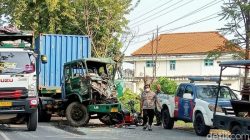President Nandi-Ndaitwah started her speech to the gathering at UDSM a couple of weeks ago with a disclaimer. The Namibian leader had been asked to speak to the audience of her personal experience, and she wondered out loud what she would say to us, because she doesn’t really think she is remarkable.
Ah, Revolutionary Mother. In half a century of self-rule, only the smallest handful of women have made it to “the top” in African states. Simply by existing, she is superlative. But, also, she is a testament to the power of the long game.
Netumbo joined Swapo when she was 14 years old and she never quit. Her work in women’s rights has contributed to a Namibia that can talk about redressing the harms of patriarchy in a balanced way in 2025. It only took 60 years of her life.
My government has developed a nasty little habit of casting any and all advocates for political, human — even economic rights — as activists.
Thus labelled, activists are then deliberately and consistently vilified as agents of chaos, of foreign interests, of social harm, of Capitalists, mental illness — the list is creatively malicious and long.
Yet there we were, gathered to listen to this lifelong activist, this professional disruptor, this intractable “bad girl.” She won her fight and instantly became a celebrated example of women’s success. Irony much, Tanzania?The only other person in leadership I have come across who acknowledged and spoke directly to the ongoing struggle for women’s full citizenship and franchise was, of all people, Lord Collins, Parliamentary Under-Secretary of State for Africa.
A lifelong labour unionist, he mused empathetically about watching the women in the unions defer their needs and “wait” for their full labour rights even as they fought alongside the menfolk. In Europe, as in Africa and everywhere else, even The Left is disappointingly patriarchal.
As I listened to Madam President, I was thinking about two things: 1. What scars might she tell of in the sacred spaces that feminists create for Sistren to speak freely and heal? 2. Seriously, though, how and where did she find a spouse who didn’t murder her career out of a deep, learned, masculinist insecurity?Read: Netumbo will need to offer leadership to Namibia, AfricaFriends, gender equity is a core issue that the next generation needs answers to more than I do. That is if y’all want healthy and sane grandchildren who will have jobs in the future to pay the taxes that will foot the bill for our incredibly expensive geriatric care.
There are real consequences to getting it wrong by insisting on “tradition,” you can ask South Korea and China about their demographics if you want to explore that. And Japan, and Italy, and increasingly maybe even the US of A.
President Nandi-Ndaithwa is in her seventies, which is grandmother territory. I was there for the intergenerationality. I can’t explain why I feel the presence of my grandmothers when I engage in certain spaces. Sometimes it feels like blessings — mostly it feels like a demand to protect our fragile future by fighting for the survival of the youth.
In that room, deep in my heart and away from the male gaze, I savoured the opportunity to witness an elder who made it.
Mother Elephant, knower of the paths to green pastures and fresh waters, scarred from battle, wise to the ways of healing, connected to the web of sisterhood in the lines of blood — our lives are defined by blood! — I greet you, and thank you just for being yourself.
Elsie Eyakuze is an independent consultant and blogger for The Mikocheni Report. Provided by SyndiGate Media Inc. (
Syndigate.info
).







